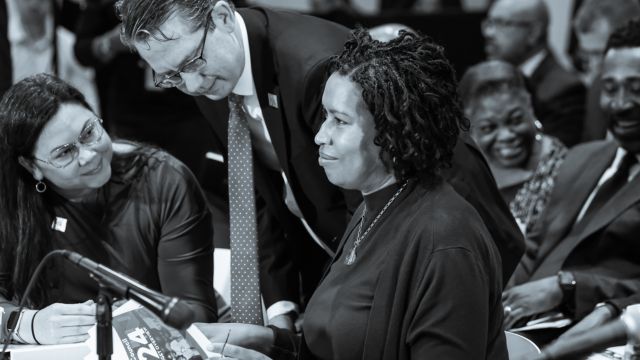WFCN –
As part of a settlement deal announced this week, real estate group AIR Communities has committed not to unlawfully discriminate against housing voucher claimants and will also pay hundreds of thousands of dollars in legal fees.
After an Equal Rights Center investigation found that applicants were wrongfully denied rental housing due to their use of government subsidies, the real estate business settled a complaint that had been initiated by the center. In a settlement agreement, AIR Communities committed to paying $235,000 for damages and legal fees. In the case, the Equal Rights Center was represented by Cohen Milstein Sellers & Toll and the Washington Lawyers’ Committee for Civil Rights and Urban Affairs. Nonprofit group ERC’s primary mission is to ensure that D.C.’s fair housing regulations are strictly enforced.
Denying housing voucher applicants access to the Latrobe Apartment Homes in Ward 2 and Vaughan Place in Ward 3 was the basis for the January lawsuit against AIR Communities (now known as AIR Property Management in the settlement) that was filed in D.C. Superior Court.
Additionally, ERC claims that AIR Communities unlawfully instituted income and credit score criteria for voucher holders as part of their application process. AIR Communities went above and beyond what is allowed by D.C. law in terms of checking eviction and criminal records, as shown in court documents.
Protecting potential renters from overbroad criminal record screenings, prohibiting discrimination based on an applicant’s income source, and prohibiting the requirement that voucher holders fulfill certain income and credit standards are all provisions of D.C. law. This lawsuit is also notable for being one of the first to implement a DC statute that, as of 2022, seals eviction records older than three years.

According to Equal Rights Center director and former housing official Kate Scott, there has been an uptick in the illegal usage of technology that facilitates tenant screening.
“The law in the District of Columbia is essentially telling you that you can’t continue doing that the way you have been,” Scott explains. To avoid perpetuating discriminatory practices that have harmed the city, landlords must adhere to the letter of the law while also taking a more personalized approach to their renters.
SEE MORE –
Impact Through Effect! Ohio Raises $3 Million for Firefighter Training through Fireworks Sales
According to ERC’s complaint, the organization used fair housing tests to examine AIR Communities’ leasing practices. To determine if individuals with vouchers, evictions on their records, or involvement with the criminal justice system were eligible to apply, the nonprofit’s investigators would use aliases to call rental offices and inquire.
Court records show that an AIR Communities representative told ERC’s covert investigator not to apply directly because they would likely be rejected or because the company’s screening process would exclude them.
Vaughan Place does not have “Section 8 units,” according to one agent who took a call from a customer. One of the references to the federal Housing Choice Voucher Program, which was formerly known as “Section 8,” is the Housing Act of 1937.
Tenants with low incomes, disabilities, or who are elderly are eligible to participate in the program, which, in principle, gives them the freedom to choose from virtually any rental property on the market, within certain limits. Housing Choice Voucher Program (HCVP) helps 11,500 low-income families in the District of Columbia find safe, affordable housing in neighborhoods with good school districts, grocery stores, and public transit.
After noticing racist sentiments on AIR Communities websites, ERC initiated their investigation. Applicants may be excluded based on their criminal history, as stated in one statement, according to the court records. “Our neighborhood does not accept tenants who have a history of criminal convictions… The tenant must not have a history of evictions.
At first, I believe most people could tell when it was affecting them. The District of Columbia’s deputy legal director for economic justice, Joanna Wasik, explains that a simple statement like “We don’t accept vouchers” by a landlord could be seen as unlawful voucher discrimination. “As time has progressed, the manifestations of discrimination have grown increasingly nuanced, making it harder for individuals to identify when it is impacting them.”
The cooperation agreement states that all properties owned by AIR Communities in the District of Columbia, including Latrobe Apartment Homes, Vaughan Place, and Upton Place East, are now required to ask potential tenants to reveal their voucher status before they are asked about their income and credit.
Additionally, the agreement states that eviction records older than three months and criminal records older than seven years cannot be considered. Housing voucher recipients might avoid having their applications denied due to income or credit restrictions by being transparent about their usage of the program.
In addition to having ERC do 30 compliance assessments on the different homes, AIR Communities employees are required to receive yearly training on fair housing legislation and choose a voucher champion.
Stephanie Joslin, the communications manager at AIR Communities, stated in an email that the company is dedicated to following all fair housing rules and regulations. She added that the company reviews its standards and procedures on a regular basis and trains its employees to remain compliant. We would like to stress that the deficiencies in our procedures that were pointed out by the Equal Rights Center (ERC) study were not the result of deliberate wrongdoing but rather of careless neglect.
The highlighted flaws were swiftly corrected, according to Joslin, “upon our own review,” even before the ERC lodged its complaint. We look forward to continuing our cooperation with the ERC in the future to provide the training and processes that the ERC has authorized.
According to Scott, voucher discrimination has persisted since the source-of-income protections were passed in 2005, and the settlement is a step in the right direction toward enforcing the District of Columbia’s rules against it.
“The data shows that most voucher holders in D.C. are Black, so when you compare that to other cities, you can see that voucher discrimination is essentially racial discrimination,” Scott explains. “And thus, that has been the central emphasis of our efforts concerning voucher discrimination or source-of-income discrimination in general.”
Despite Black households making up less than half of the District’s overall population, about 95% of those who receive housing vouchers in D.C. are Black, according to 2023 Census statistics.
Scott expresses optimism that the District’s noncompliance difficulties will be reduced and that individual renters will have an easier time locating the home they require; this is due to the fact that the agency has entered into cooperative agreements.
